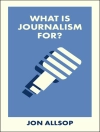To what extent does journalism deserve blame for the failure to address climate change over the last thirty years? Critics point out that climate coverage has often lacked necessary urgency and hewed to traditional notions of objectivity and balance that allowed powerful interests—mainly fossil fuel companies—to manufacture doubt. Climate journalism, however, developed alongside the digital media landscape, which is characterized by rampant misinformation, political polarization, unaccountable tech companies, unchecked corporate power, and vast inequalities. Under these circumstances, journalism struggled, and bad actors flourished, muddling messages while emissions mounted and societies struggled to avert catastrophe.
The Mediated Climate explores the places where the climate and information crises meet, examining how journalism, activism, corporations, and Big Tech compete to influence the public. Adrienne Russell argues that the inadequate response to climate change is intertwined with the profound challenges facing the communications environment. She demonstrates that the information crisis is driven not only by technological changes but also by concentrated power that predates the rise of digital media companies. Efforts to improve climate coverage must take into account the larger social and material contexts in which journalism operates and the broader power dynamics that shape public discourse. Drawing on interviews with journalists and activists, Russell considers the ways recent movements are battling misinformation. She offers timely recommendations to foster engagement with climate issues and calls on readers to join in efforts to reshape the media landscape to better serve the public interest.
Tabella dei contenuti
Introduction: Two Crises
1. House on Fire
2. Noise, Incivility, and Ambivalence
3. After Peak Indifference
4. Collective Imaginary
Acknowledgments
Notes
Bibliography
Index
Circa l’autore
Adrienne Russell is Mary Laird Wood Professor and codirector of the Center for Journalism, Media, and Democracy in the Department of Communication at the University of Washington. Her books include
Networked: A Contemporary History of News in Transition (2011) and
Journalism as Activism: Recoding Media Power (2016).












